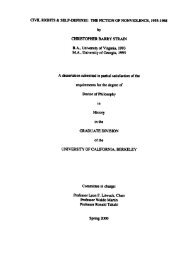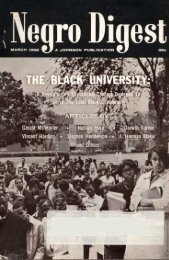Black News - Freedom Archives
Black News - Freedom Archives
Black News - Freedom Archives
Create successful ePaper yourself
Turn your PDF publications into a flip-book with our unique Google optimized e-Paper software.
Legacy<br />
"While in High School, I never missed a band, whether<br />
a known or unknown unit . I loved music beyond the stage<br />
of liking it . Some of the bands I heard never got popular<br />
and never made hit records, but they were truly natural<br />
<strong>Black</strong> beauty . I want to thank them and I want to ,;give<br />
honour to all the sincere musicians who ever were or ever<br />
will be . It's wonderful to even think about such people .<br />
The music they played was a natural happiness of love, so<br />
rare I cannot explain it . It was fresh and courageous;<br />
daring, sincere, unfettered. It was unmanufactured avantgarde,<br />
and still is, because there was no place .for it in the<br />
world, so the world neglected something Qf value and did<br />
not understand . And all along I could not understand why<br />
the world coul(l not understand. It was all there . Was it<br />
because the world considers music as onl v a commercial<br />
commodity? I am glad that that is not my code . "<br />
Sun Ra<br />
Our music is our heartbeat ; the pulse within us<br />
that underlies all we do . Our musicians are the<br />
muscle that keep life flowing deep inside . It is<br />
our music that has worked incessantly to keep us<br />
alive for the last 400-plus years . Field hollers,<br />
gospel shouts, the blues, a Coltrane solo, sounds<br />
of the drum are all measures of our survivals and<br />
struggles . Mere human bodies become the vessels<br />
that contain this vibrant aural/oral energy . The<br />
flesh is fragile and sometimes weak but <strong>Black</strong><br />
musicians continue to use this sound force<br />
despite their imperfections . Few <strong>Black</strong> musicians<br />
die of old age. Many factors contribute to<br />
terminating creativity in a society that relegates<br />
<strong>Black</strong> music to the back door . Mysterious<br />
diseases, O.D .'s, alcohol, violence, are some of<br />
the occupational hazards the <strong>Black</strong> musician<br />
`,,' S must face . So it was with Charles Mingus, a giant<br />
who cast a shadow over the entire music world .<br />
Charles Mingus was born on any Army base in<br />
Nogales, Arizona in 1922 . He is one of the many<br />
<strong>Black</strong> musicians born in the Southwest . No<br />
by Basir Mchawi matter what the census bureau would tell us, I~lack<br />
people are scattered all over America . Mingus<br />
soon moved to the Watts district of Los , ngele!<br />
with his family, where he was exposed to the<br />
many facets of <strong>Black</strong> music . Mingus" first love<br />
were the blues and gospel music, both aspects of<br />
the same force, one secular, one sacred . Mingu<br />
would later become one of the exponents o<br />
combining the secular and the sacred to create a<br />
very funky yet folksy feeling. As a youngster<br />
Mingus was,given a trombone which he played<br />
for quite a while, but by the time he had reached<br />
high school he had beerl converted to playing the<br />
string bass .<br />
Charles Mingus first learned the intricacies o<br />
his instrument by playing along with records and<br />
the radio . Later his training became more forma<br />
as he studied with Red Callender, a top L.A<br />
bassist . Soon Mingus was playing with folks likt<br />
Buddy Collette, Chico Hamilton, anti other Iota<br />
musicians . Aside from playing, Mingus like<br />
composing . He wrote almost as much as h,<br />
played, chasing the sounds he heard in his head<br />
A big jump in his development came when pian(<br />
master Art Tatum came to Watts and invite(<br />
Mingus to play with him as a duo. They<br />
rehearsed for days on end, but could find ni<br />
work . Soon Tatum went on the road as a solor<br />
Bolt<br />
performer leaving Mingus to dream of the tim,<br />
when they would meet again . Mingus began<br />
making a rep as a bassist who didn't just pla ;<br />
rhythm and harmony, but got involved in th,<br />
melody . The Mingus concept was not like mos<br />
other bassists of the day . Listeners and othe<br />
musicians both began to take notice whe<br />
Mingus played .<br />
After more study including an internship wit h<br />
a classical bassist, Mingus headed for tie <strong>Black</strong><br />
music capital, New York . By 1952, Mingus hat<br />
played with Bud Powell, Dizzy Cillespie, Ma :<br />
Roach, Art Tatum, and Charlie Parker . In Ma ,<br />
of 1953 Mingus took part along with Bird, Diz<br />
Bud, and Max in what has been called "the<br />
greatest jazz concert ever ." This concert wa s<br />
held at Toronot's Massey Hall and incidentally<br />
we can hear it on record today, because Charli e<br />
Mingus had brought along a tape recorder . Soon<br />
after this concert Mingus formed a number o f<br />
experimental groups all called The JAZ;<br />
WORKSHOP . These groups perfected music
















